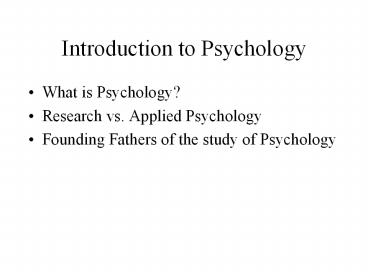Introduction to Psychology - PowerPoint PPT Presentation
1 / 17
Title:
Introduction to Psychology
Description:
Introduction to Psychology What is Psychology? Research vs. Applied Psychology Founding Fathers of the study of Psychology Introduction to Psychology What is Psychology? – PowerPoint PPT presentation
Number of Views:142
Avg rating:3.0/5.0
Title: Introduction to Psychology
1
Introduction to Psychology
- What is Psychology?
- Research vs. Applied Psychology
- Founding Fathers of the study of Psychology
2
What is Psychology?
The scientific study of behavior and mental
processes and how they are affected by an
organisms physical, state, mental state, and
external environment.
3
What is Psychology?
The scientific study of behavior and mental
processes and how they are affected by an
organisms physical, state, mental state, and
external environment.
- Scientific study requires several things
- Framework / theory
- Testable Hypotheses
- Measurable and valid evidence / data
4
What is Psychology?
The scientific study of behavior and mental
processes and how they are affected by an
organisms physical, state, mental state, and
external environment.
- Behavior and mental processes include overt,
observable instances but also include subtle
kinds of instances, like brain activity.
5
What is Psychology?
The scientific study of behavior and mental
processes and how they are affected by an
organisms physical, state, mental state, and
external environment.
- Humans and may other creatures included in the
scientific study of behavior and mental processes
6
What is Psychology?
The scientific study of behavior and mental
processes and how they are affected by an
organisms physical state, mental state, and
external environment.
- Physical state relates primarily to the
organisms biology - most especially the state of
the brain and central nervous system
7
What is Psychology?
The scientific study of behavior and mental
processes and how they are affected by an
organisms physical state, mental state, and
external environment.
- Mental state does not have to be conscious - can
study mental states in many creatures without
their conscious awareness - and can be studied in
terms of brain activity.
8
What is Psychology?
The scientific study of behavior and mental
processes and how they are affected by an
organisms physical state, mental state, and
external environment.
- All organisms function in an environment that is
constantly presenting them with problems and
challenges that must be solved.
9
What is Psychology?
The scientific study of behavior and mental
processes and how they are affected by an
organisms physical state, mental state, and
external environment.
- Most people think of psychology as the study of
differences between people, but it also includes
the study of similarities between people.
10
- RESEARCH
- APPLIED
- gtgt STUDY
- Origin, cause, results
- College / University
- Think Tanks (govt)
- Independent Researchers
- Drug Companies
- gtgt USE
- Apply the study results
- Psychiatrists
- Counselors
- Therapists
- Teachers
- Social Workers
11
The Founding Fathers who have helped shape
Psychology
- Charles Darwin
- The Theory of Evolution (1859)
- Study of animals could reveal something about
humans - Inspired scientists to study behavior
12
The Founding Fathers who have helped shape
Psychology
- Wilhelm Wundt
- Father of Psychology
- 1879 started laboratory for studying humans
- Human behavior can be studied measured
scientifically - Objectivity vs. Introspection
13
- Sigmund Freud (late 1800s-early 1900s)
- Development of Personality theory
- Influenced by early childhood experiences
unconscious conflicts within ourselves
14
- William James (published text 1890)
- Focus on human functioning in adaptation to
their environment - Study the human experience as a whole
- We all react differently to the world
- Basic rules apply to human emotion, but never
lose sight of the individual!
15
- John B. Watson (1920s)
- Learning theory
- Behaviorism the impact of learning on human
emotion - We are what we learn to be
- Favored structured child-rearing
16
- B.F. Skinner (1950s-1990)
- Focused on the effects of environment and what it
forces us to be (good or bad) - Scientific study of observable behaviors, not
thoughts
17
The Six Theories of Psychology (pages 11-17)
NEUROBIOLOGY behavior is the result of nervous
system and biology
BEHAVIORISM behavior is the result of learning
and associations
HUMANISM people are basically good and capable
of helping themselves
PSYCHOLOANALYTIC viewing the individual as the
product of unconscious forces
COGNITIVE how humans use mental processes to
handle problems or develop certain personality
characteristics
SOCIOCULTURAL behavior influenced by the rules
and expectations of social groups or cultures.

